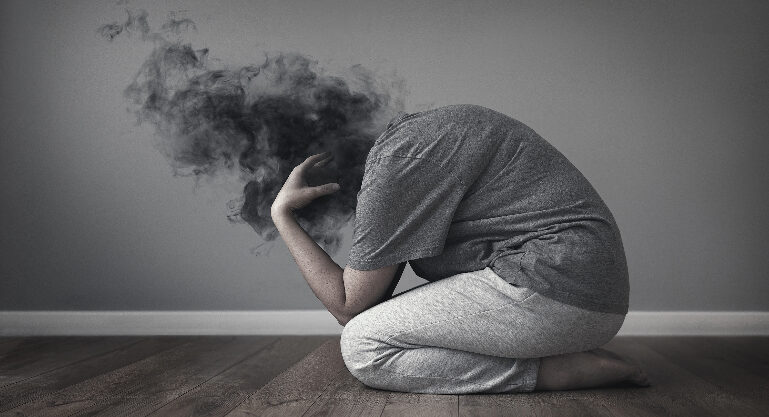The usually wondering: “Is depression something I inherited from my family, or is it because of my lifestyle and experiences?” The truth is, it’s both. Depression is multifactorial: it’s influenced by biology, genetics, brain chemistry, environment, and life experiences.
1. Genetics: The Family Connection
- Research shows depression runs in families. If a parent or sibling has major depression, your risk is higher.
- But it’s not a single “depression gene.” Instead, it’s many genes, each adding a small effect.
- Having the genes doesn’t guarantee depression, it raises vulnerability. Environment often decides if it’s “switched on.”
- Twin studies: if one identical twin has depression, the other has a 40–50% chance of developing it too.
Translation: Genetics load the gun, but environment pulls the trigger.
2. Brain Chemistry & Biology
- Depression is linked to imbalances in neurotransmitters (serotonin, dopamine, norepinephrine) that regulate mood.
- Brain scans show changes in the hippocampus (memory), prefrontal cortex (decision-making), and amygdala (emotions).
- Chronic stress can shrink brain regions involved in mood regulation.
3. Life Events & Environment
- Trauma, loss, abuse, neglect, or chronic stress can trigger depression.
- Financial struggles, unemployment, and relationship conflicts are major U.S. stressors.
- Even positive changes (moving, new job, having a baby) can create enough stress to spark depression in vulnerable individuals.
4. Medical Conditions & Medications
- Chronic illnesses (diabetes, heart disease, cancer) increase depression risk.
- Hormonal changes (postpartum, thyroid issues, menopause) play a role.
- Certain medications (steroids, blood pressure meds) can trigger depression as a side effect.
5. Personality & Coping Style
- People with perfectionist tendencies, high self-criticism, or chronic worry may be more prone.
- Low social support or isolation also increases vulnerability.
6. So, Is It Genetic or Environmental?
It’s both. Depression is best explained as a gene–environment interaction:
- Genes – risk factors.
- Environment/life – triggers.
- Brain biology – the middle ground where those risks and triggers play out.
Depression isn’t caused by one thing, it’s the result of genetic vulnerability + brain chemistry + life experiences + environment. If your family has a history, it doesn’t mean you’re doomed. It just means you may need to be more proactive with mental health care, lifestyle, and early intervention.
Ayurveda on the Causes of Depression
let’s now dive into the Ayurveda perspective on the causes of depression. Ayurveda doesn’t frame depression as a “disease of the brain” alone. Instead, it sees it as the result of imbalances in body, mind, and spirit, when the doshas, digestive fire (Agni), life-force (Prana), and vital energy (Ojas) fall out of harmony.
1. Dosha Imbalances Behind Depression
- Vata imbalance (air + space):
- Creates anxiety, restlessness, overthinking, emptiness.
- Leads to fear-driven depression, mind feels scattered and unstable.
- Creates anxiety, restlessness, overthinking, emptiness.
- Pitta imbalance (fire + water):
- Causes irritability, anger, self-criticism, perfectionism.
- Depression here looks like rage turned inward, guilt, or burnout.
- Causes irritability, anger, self-criticism, perfectionism.
- Kapha imbalance (earth + water):
- Produces heaviness, lethargy, oversleeping, withdrawal.
- Depression feels like being “stuck in mud,” with low energy and lack of motivation.
- Produces heaviness, lethargy, oversleeping, withdrawal.
Same “depression” label, but Ayurveda says the root cause depends on which dosha dominates the imbalance.
2. Agni (Digestive Fire) and Ama (Toxins)
- Weak or unstable Agni (digestion) creates Ama (toxins) in the body.
- These toxins clog the manovaha srotas (mental channels), clouding clarity and lowering mood.
- Modern parallel: poor diet and gut health are now proven to affect mental health via the gut-brain connection. Ayurveda recognized this centuries ago.
3. Prana, Tejas, and Ojas (The Subtle Forces)
- Prana (life energy): When blocked, mind feels anxious or scattered.
- Tejas (inner fire): When overheated, it burns out mental calm > anger, irritability.
- Ojas (vital resilience): Depleted by chronic stress, grief, or poor lifestyle, leading to fatigue, sadness, and vulnerability to depression.
4. The Role of Gunas (Mental Qualities)
Ayurveda says the mind is shaped by three qualities:
- Sattva (clarity, harmony): healthy state of peace and balance.
- Rajas (restlessness, overactivity): excess > agitation, stress, and racing thoughts.
- Tamas (heaviness, inertia): excess > dullness, lethargy, hopelessness.
Depression is often a dominance of Tamas (heavy, stagnant mind) sometimes mixed with Rajas (agitation).
5. Lifestyle and Environmental Triggers
Ayurveda highlights daily habits that can “cause” depression by disturbing doshas:
- Irregular routines: erratic sleep, meals, or work hours (aggravates Vata).
- Overwork & overstimulation: constant stress, competitiveness, screens (overheats Pitta).
- Inactivity & heavy diet: lack of movement, junk food, excessive sleep (worsens Kapha).
- Suppressed emotions: unprocessed grief, anger, or fear accumulate as psychological Ama.
- Disconnection from nature & community: loneliness, lack of purpose, artificial lifestyle.
6. Ayurveda’s Core Insight
Modern science says: “Depression comes from genes, brain chemistry, and environment.”
Ayurveda adds: “Depression arises when doshas are imbalanced, digestion weakens, Ojas depletes, and the mind is dominated by Rajas and Tamas instead of Sattva.”
Both systems agree: depression is multi-causal, not a character flaw. The Ayurvedic view widens the lens, showing how lifestyle, diet, emotions, and inner balance all feed into mental well-being.
In Short:
In Ayurveda, the causes of depression include dosha imbalance (Vata/Pitta/Kapha), weak digestion leading to Ama, depletion of Ojas, disturbed mental qualities (Rajas & Tamas), and lifestyle misalignments. Healing begins not just with the mind, but with the whole system: body, food, energy, routine, and emotional health.



